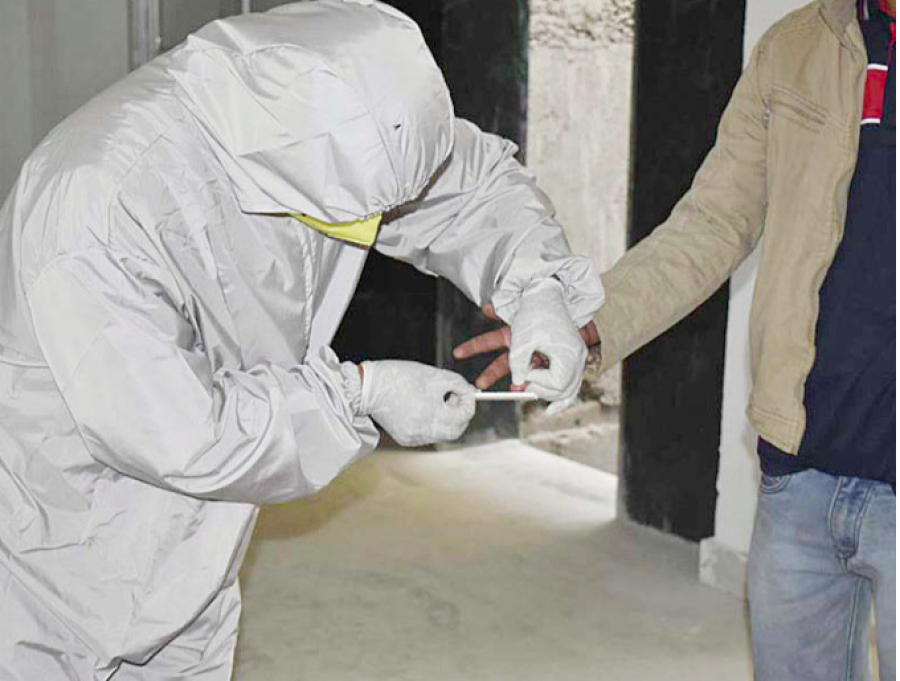Health
Health Ministry purchasing additional 100,000 rapid diagnostic test kits via fast track process
Public health experts suggest to perform polymerase chain reaction test mandatorily on suspects.
Arjun Poudel
Amid a concern over the efficacy of rapid diagnostic test kits purchased from China, the Ministry of Health and Population has started the process to purchase additional 100,000 RDT kits through fast track procedures.
According to Bhogendra Dotel, director at Management Division under the Department of Health Services, the deadline for the procurement tender called three days ago expired on Monday.
“We have distributed all the test kits bought from China earlier. We need additional kits immediately as their demand is too high,” Dotel told the Post.
Earlier, the Ministry of Health and Population had purchased 75,000 RDT kits for
$600,000. The procurement process had landed in controversy after it was revealed that the ministry had awarded the contract to Omni Business Corporate International, a private firm, without following the Public Procurement Regulation.
Furthermore, Omni had failed to deliver the goods on time while its procurement process was also questionable.
The government has since scrapped the contract with Omni. It has also distributed the RDT kits, supplied by the company, to health facilities across the country without determining their efficacy.
Public health experts have questioned the validity of the test results from those kits. They have also suggested not to rely only on the rapid tests, which can give misleading results sometimes as seen in Udayapur where the people residing in a mosque whose RDT test results came negative, only to later test positive when they underwent polymerase chain reaction tests.
Before that, a 65-year-old woman from Kailali, who spent 14 days in quarantine and was allowed to go home after her RDT results came negative, had also found to be Covid-19 positive in PCR test.
“We should learn from our own experience that the rapid diagnostic test does not give reliable results,” Dr Harischandra Upreti, former director at the National Public Health Laboratory, told the Post. “Coronavirus can spread in the community if we send the suspected patients home on the basis of negative results in rapid tests.”
RDT kits are basically used for mass testing to screen for antibodies against the virus. Antibody does not develop in the first week of infection and the rapid tests do not give negative or positive results. Concerned authorities have been releasing people in six days and seven days on the basis of negative results of rapid tests.
Upreti said that rapid kits have low sensitivity to confirm that the person is infected with virus and low specificity to confirm that the person is not infected.
“The dangerous thing is that suspects, staying in quarantine are being released on the basis of negative results of the rapid test,” said Upreti. “Chances of spreading disease by such people will be high from those released on the basis of rapid test results, as they will mix-up with family and move freely.”
Dr Anup Subedee, a consultant infectious disease physician, also said that sending the suspected Covid-19 patients home on the basis of negative results derived from rapid tests is technically a wrong decision, and is also against the government’s official guideline.
“On Sunday, a man who was in mourning was allowed to go home six days after rapid test results,” Subedee told the Post. “I think there is a huge communication gap between the Health Ministry and staff working in the field. Suspects should not be allowed to go home even if the rapid test shows negative results.”
In the official guideline, it has been stated that a rapid test is performed after 14 days. If the result of the rapid test starts being taken for granted, health workers too believe that the case is negative and do not perform additional tests on them.
An official at the Epidemiology and Disease Control Division said that rapid tests are only useful for antibody screening for epidemiological study to know if the subjects were infected with virus in the past.
Meanwhile, health experts have suggested the government use GeneXpert machine, which is generally employed to test for tuberculosis to test the Covid-19 if possible.
Diagnostic company Cepheid has received authorisation from The United State’s Food and Drug Administration to use rapid molecular tests using the Gene Xpert machine for point-of-care results. The new method can detect the presence of the coronavirus in 45 minutes.
“We have advised the government to use GeneXpert machines to test Covid 19,” Dr Anup Subedee said, “We can easily scale up our testing capacity if we use the machine.”
Nepal has over 80 GeneXpert machines across the country.




 13.12°C Kathmandu
13.12°C Kathmandu















